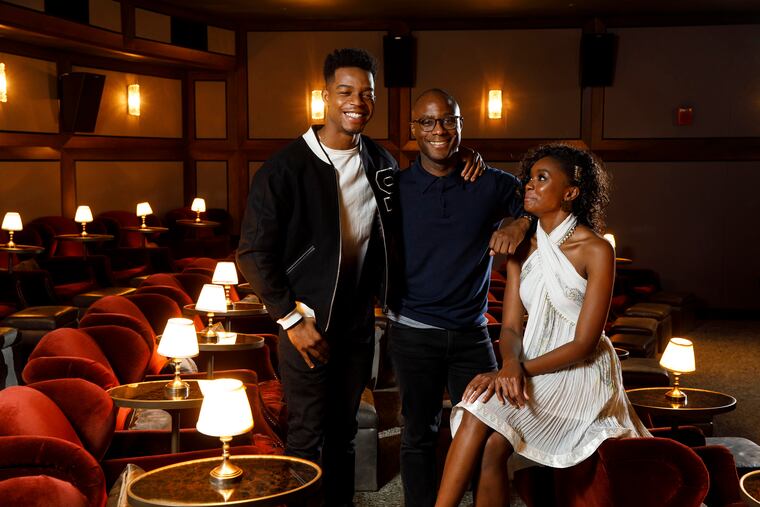Barry Jenkins on ‘If Beale Street Could Talk’ and a banner year for black directors
Oscar-winner Barry Jenkins talks about adapting James Baldwin for the screen in 'If Beale Street Could Talk.'

For director Barry Jenkins, accustomed to shoestring budgets, winning an Oscar changed his career in an important and slightly intimidating way — his impossible dreams were now suddenly possible.
Jenkins, whose Moonlight won best picture, and best screenplay for him, had long wanted to adapt James Baldwin’s If Beale Street Could Talk but figured it would always be out of his reach. The book is set in the 1970s, period pieces take lots of money, and Jenkins is a guy whose first movie, My Josephine, cost about $12,000 — roughly the bill for catering on a film like Beale Street.
“I never thought I’d get to make a period piece,” said Jenkins, who stopped in Philadelphia recently to talk about the movie, which was released on Christmas. “Also, I never thought I’d have the luxury of having an idea and suddenly realize, hey, there’s nothing really to stop me from doing that.”
After his double win for Moonlight, Jenkins dove into Beale, and although he loved the experience, he found a new range of challenges — like the unanticipated problem of finding it necessary to alter the story he so loved on the page.
“They say never meet your heroes. They might also say never adapt your heroes,” said the director, who found that once he cast the movie and began shooting it, the performances led to changes in the story. “I have such great respect and reverence for [Baldwin], but at a certain point, I realized I have to take the story in a slightly different direction. You make a film, and the actors take possession of the characters.”
If Beale Street Could Talk is the story of a young couple (KiKi Layne, Stephan James) who are separated when he is imprisoned on a false charge. Layne’s character tries to keep James’ character’s spirits up with prison visits while members of both families work to win his release.
“Stephan James’ performance in that last prison visit, when I showed it to people, they just assumed that he was a defeated man, just completely withdrawn,” said Jenkins. That’s where the book ends, and Jenkins assumed viewers would assume the worst about the character’s future — giving Beale Street, in his view, an ending that was unfairly bleak.
“I decided to extend the narrative, and in doing so, incorporated some ideas that KiKi had brought to the story, and now we have something that I thinks works really well,” Jenkins said, adding that he was careful not to change or undermine the important themes of Baldwin’s story.
The American Film Institute named If Beale Street Could Talk one its movies of the year, and it’s been nominated for three Golden Globes for Jenkins’ screenplay, best picture, and Regina King for best supporting actress, playing Layne’s mother.
So Jenkins almost certainly finds himself in another Oscar race, this time likely competing in different categories with other African American filmmakers — Spike Lee (BlacKkKlansman) and Ryan Coogler (Black Panther).
He’s excited there are so many African American directors releasing movies this year, and making so many different kinds of movies — for instance, Ava Duvernay (A Wrinkle in Time) George Tillman Jr. (The Hate U Give), Steve McQueen (Widows), Boots Riley (Sorry to Bother You).
“I think what’s also so exciting is that one doesn’t resemble the other,” he said. “Black Panther is nothing like Beale Street ,which is nothing like Sorry to Bother You.”
And none is like Creed II from director Steven Caple Jr. – I mentioned that I’d interviewed him in the same room just a month earlier.
“Seriously, that’s when you know you’re making real progress, because you worry about leaving people out, because there are so many. Still not enough, but there was a time when there would be one or two, and Spike would be one,” Jenkins said.
He sees the momentum continuing. African American filmmakers who’ve broken through are also making shrewd choices about holding their place and expanding opportunities for others.
“Look at Ava Duvernay. She makes an indie, she makes Selma, she makes A Wrinkle in Time, she starts her own production company, and she makes a TV show [Queen Sugar] that hires female directors. That’s how change becomes permanent,” he said.
Jenkins, who also made a low-budget indie (Medicine for Melancholy), then Moonlight, then Beale Street, is now taking on his own sizable production for Amazon — an ambitious, 11-part adaptation of Colson Whitehead’s Pulitzer Prize-winning novel The Underground Railroad.
“It makes change a progress and a direction, and not a destination. When you hit a destination, it’s easy to sink again and to backslide, and I don’t think that’s possible now.”